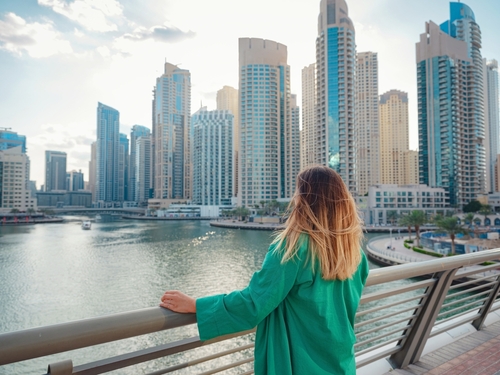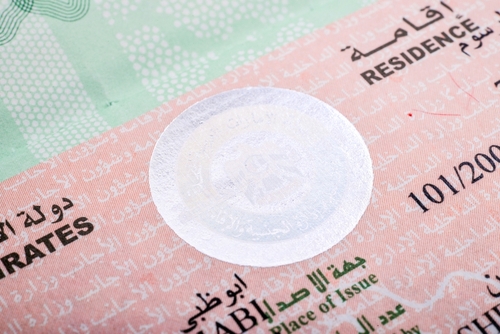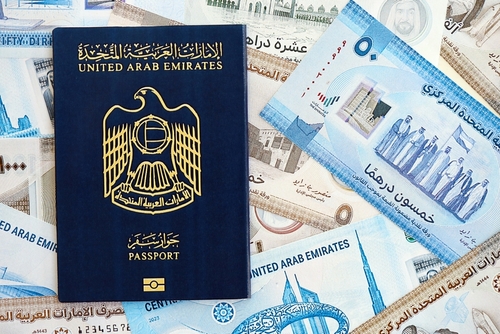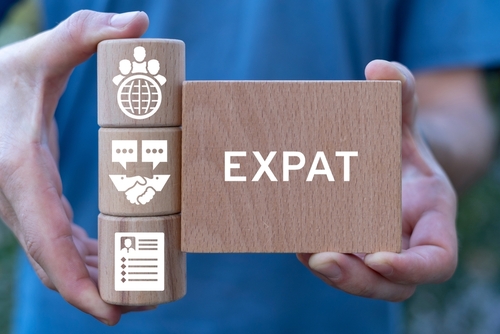If you’ve spent time in the United Arab Emirates (UAE), you’ve probably heard people refer to themselves—or other people—as expats, immigrants, or migrant workers. While these phrases are used here everyday, many newcomers wonder what they mean. Understanding the meaning of expat can help you make sense of your place in this diverse country.
At Remitly, we understand how confusing all of this can be—that’s why we’ve put together this comprehensive guide. Let’s dive into what an expat is, how it differs from an immigrant, and how you can start living in the UAE as an expat.
What is the actual meaning of expat?
The word “expat” is short for “expatriate,” and it simply refers to someone living outside of their home country. It’s a broad term that usually includes people who move abroad for work, study, or family reasons, but who might want to return to their home country at some point in the future.
This sets them apart from an immigrant. Usually, immigrants plan to stay in their new country—such as the UAE—permanently. The concept of being an expat is based on a few different areas:
- Residence: You’re living in a country you weren’t born or raised in.
- Duration: You’re usually only planning to stay for a relatively short amount of time.
- Purpose: You likely moved for academics, work, business opportunities, or family.
- Intent: You plan on moving back to your home country or traveling between countries.
Still not sure what the difference is between an expat, an immigrant, and a migrant worker? Let’s break down the meaning of each term a little more to make them less confusing.

Expat vs. immigrant: What’s the difference?
Words like “expat,” “immigrant,” and “migrant” are often used interchangeably. And yes, they are similar, but—technically—they don’t all mean the same thing.
Let’s break them down:
| Term | Definition | Typical duration | Common associations |
| Expat | A person temporarily or semi-permanently living abroad, often for work. | Short- to medium-term. | Often linked to professionals or skilled workers. |
| Immigrant | A person who moves to another country to live there permanently. | Long-term or permanent. | Usually associated with people seeking residency or citizenship. |
| Migrant worker | Someone who moves temporarily for work, often in labor intensive industries. | Often short-term. | Common in industries like construction, retail, and domestic work. |
This might make it all seem simple, but how people use the terms can actually vary significantly. In a lot of the world—including the UAE—the word “expat” is more commonly used for skilled professionals and white-collar workers, while “migrant worker” or “immigrant” tend to be used more for those in manual or service jobs.
This doesn’t reflect the true diversity of life abroad, however. Every person who moves to the country is a welcome and vital part of the UAE’s expat community.
Am I an expat?
While the differences between expats, immigrants, and migrant workers are clear, you might still be wondering: Am I an expat? If so, consider these questions:
- Are you living outside of your country of citizenship?
- Did you move primarily for employment, business, or family reasons?
- Is your residency tied to a visa or sponsor?
- Do you maintain strong connections to your home country, such as family or property?
If you’ve answered “yes” to most or all of these, then you’re an expat. But, don’t stress about labels. What matters most is feeling comfortable and included in your community, whether you see yourself as an expat, immigrant, or migrant worker. You’re still a part of the UAE’s vibrant culture.
Living in the UAE as an expat
The UAE’s history is deeply intertwined with expats, and it can be seen as a region partly built by them. Expats have taken the UAE from a modest trading hub to a global business and tourism hub. Spanning everything from financial analysts and teachers to healthcare professionals and entrepreneurs, foreign workers have been essential to the UAE’s economy.
Dubai and Abu Dhabi, in particular, attract professionals who are drawn to the tax-free salaries and cosmopolitan lifestyle.
Over 200 nationalities now call the UAE home and have found the region to be nothing but welcoming and warm. Expat life here blends global diversity with strong local traditions, like:
- Fridays are a common day off for family and community gatherings.
- Major holidays like Eid al-Fitr, Diwali, and Christmas are celebrated by different communities.
- English is widely spoken, though it’s common to pick up common Arabic phrases.
Thinking of moving to the UAE as an expat? This can be a tricky area to navigate, no matter which country you’re moving to the region from, but here are some starter points to consider.

Visas and legal system
Most expats living in the UAE live under a sponsorship program, so their visa and residency are linked to either their family or the company they work for. But, there are several ways to live in the UAE legally, like:
| Visa type | Duration | Eligibility criteria |
| Employment visa | Two to three years. | You must be sponsored by a UAE-based company and have a valid employment contract, alongside specific qualifications. |
| Residency visa | Renewable. | Either through buying—or investing in—property or by being sponsored by family. |
| Investor visa | Three years. | You have to invest a sizable amount in a government-approved company or project. |
| Retirement visa | Five to ten years. | You’ll have to be over 55, a retiree, and meet specific financial requirements. |
| Student visa | One year. | You have to be enrolled in an accredited college or university in the UAE. |
The specific requirements for each of these can be updated regularly, so anyone planning to move to the UAE should check out the official UAE Government portal for exact information.
Why the UAE attracts so many expats
You may be thinking of moving to the UAE for several reasons. It boasts a growing economy, pro-business regulations, an attractive lifestyle, and the ability to work remotely for companies abroad. Many multinational companies are establishing ties to the area, fueling the demand for skilled professionals.
The tax-free income system also builds interest. If you’re working in the UAE, you’ll keep more of the money you earn compared to the rest of the world.
Then there’s the standard of living. While this comes at a comparably high cost compared to other countries, the quality of healthcare, infrastructure, and education is exceptional. The UAE is a great pick for expats moving with their families or who’re looking to start a family relatively soon.
These quality of life and tax benefits aren’t the only reasons to move to the UAE. The region offers plenty of positives, like:
- Career growth: The UAE’s economy is expanding across the tech, healthcare, finance, and education industries, allowing for plenty of career growth for professionals.
- Global exposure: Expats have the opportunity to meet people from around the globe, broadening their worldview and creating new experiences.
- Personal growth: Foreigners living in the UAE don’t just see professional growth; the new experiences and cultural richness help them grow personally, too.
Expats often see their time in the UAE as a life-changing experience, where they see a mix of professional advancement, cultural diversity, and personal growth.

Challenges
That doesn’t mean living in the UAE is always a breeze—it comes with its challenges. Knowing what these challenges could be can help you prepare for them:
- Adjusting to a new culture and climate, especially the summer heat.
- Homesickness when you’re particularly far from family.
- Understanding local laws when they’re especially different from home.
- Being dependent on an employer for your visa sponsorship.
Despite these hurdles, most expats quickly adapt with the support of the UAE’s vibrant international community.
Tips for thriving as an expat in the UAE
As easy as these hurdles can be to overcome, a few tips for living in the UAE as an expat always help. They’ll help you adjust and get comfortable quickly, with the most helpful being:
- Respect local customs: The UAE is welcoming but values cultural respect. It might be a good idea to dress modestly in public and avoid public displays of affection.
- Learn some Arabic: Even basic greetings like “Marhaba” (hello) or “Shukran” (thank you) can be a great help in daily life.
- Organize your paperwork: Keep copies of your passport, visa, and Emirates ID in both physical and digital forms for when you need them.
- Explore beyond the city: While the cities in the region are central hubs, the UAE offers more than just that, and the countryside is always worth visiting.
- Build a social network: Join online expat groups, community clubs, and professional meetups to help expand your social circle.
While it’s natural to feel a little anxious when you first move, life as an expat in the UAE gets easier and more comfortable. It just takes an adjustment period.
The real meaning of expat
Being an expat is more than just living in another country. Instead, it involves growth, connection, and opportunity.
Being an expat in the UAE means joining a global community that values ambition, cultural exchange, and diversity. No matter where you’re from, your story is part of what makes the UAE such a vibrant place to live.
Whether you’re just there to live and study for a few years or want to spend a decent part of your retirement life there, being an expat means taking advantage of a cultural melting pot that boasts endless opportunities for growth.
At Remitly, we understand the challenges and rewards of living in the UAE as an expat. That’s why we’re committed to making money transfers safe, reliable, and fast for expats who need to send money to and from their home country.
FAQs
What is the meaning of expat?
An expat—short for expatriate—is a person living outside of their home country, often for work or study.
Is an expat the same as an immigrant?
Not quite. Expats usually live abroad temporarily, while immigrants move to another country permanently, usually to work and start a new life.
Who qualifies as an expat in the UAE?
Almost anyone living in the UAE who isn’t a UAE citizen is considered an expat, though those who plan on living and working there long-term could be considered an immigrant.
Do expats pay tax in the UAE?
The UAE doesn’t have any income tax, which is one of the main financial reasons why people decide to move to, live in, and work there.
Can expats become permanent residents in the UAE?
While there isn’t a standard permanent residency in the UAE, long-term options like the Golden Visa offer five to ten years of residency.
What is life like for expats in Dubai and Abu Dhabi?
It’s modern, multicultural, and filled with opportunity. Both cities offer strong expat networks, top facilities, and extensive career options across multiple industries.
